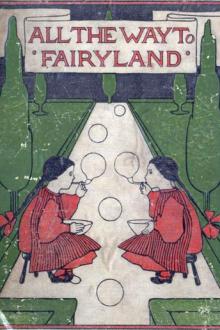A Woman's War by Warwick Deeping (top romance novels txt) 📕

- Author: Warwick Deeping
- Performer: -
Book online «A Woman's War by Warwick Deeping (top romance novels txt) 📕». Author Warwick Deeping
Catherine watched his face as he spoke.
“Of course you realize
“The nature of the case? I realize it, Mrs. Murchison, too gravely to admit this meeting to be a pleasure.”
His chilly suavity reacted on Catherine as Betty Steel
had promised. Individual antipathy comes quickly to
the surface. Any display of feeling before Parker Steel
would have been like throwing a burning torch down
into the snow.
“I presume you realize the nature of the responsibility
you are assuming?”
Her tone had nothing of pacification or appeal. The
curve of her neck became the more haughty as she realized
the purpose of the man to whom she spoke.
“It is my responsibility, Mrs. Murchison,” and he
bent his slim and black-sheathed figure slightly over the
rail of the chair, “that makes this interview the more
painful to me.”
“You have accused my husband of gross incompetence
and carelessness.”
“I have stated facts.”
“Dr. Murchison’s surgical experience is not that of a
mere theorist. It has an established reputation. You
understand me?”
Parker Steel understood her perfectly, his nostrils lifting at the rebuff.
“My duty, Mrs. Murchison, is towards my own conscience.”
“I do not deny your sense of duty.”
“And the facts of the case—”
“Say rather your interpretation of those facts.”
“Madam!”
“For in the interpretation lies the meaning of your
action. I can only warn you, for your own sake, to be
careful.”
Parker Steel’s mask of unsympathetic suavity lost its
unflurried coldness for the moment.
“My dear Mrs. Murchison, I have my day’s work before me, and I am a busy man. It is my misfortune to
have earned your resentment by the discovery of a blunder.
Please consider the question to be beyond our individual
interests.”
“Then I am to understand?”
“That I have already adopted the only course that
seemed honest to me. I have declined to give a death
certificate and I have communicated with the coroner.”
Catherine took the blow without flinching, though a
deep resentment stirred in her as she remembered how
her husband had bulwarked Parker Steel.
“Then I think there is nothing more to be said between
us.”
The physician made a step towards the door.
“Accept my regrets” the vanity of the man, the desire
to stand well in the eyes of a handsome woman, was not
wholly to be suppressed.
“I accept no regrets, Dr. Steel—”
“Indeed.”
“For no regrets are given. My eyes are open to the
truth.”
Steel turned the handle of the door.
“A sense of duty makes us enemies, Mrs. Murchison.”
“Perhaps, sir, your very lively sense of duty may lead
you some day into a lane that has no turning.”
Whether by chance, or by premeditated malice, Mrs.
Betty crossed the hall as Catherine left the drawingroom.
She halted, smiled, and extended a languid hand. Her
eyes recalled to Catherine the eyes of the previous night.
“Ah, goodmorning, Kate.”
There was not a quiver of emotion on Catherine Murchison ‘s face. She looked at Mrs. Betty as she would
have looked at some pert shop-girl who assured her that
some warranted material had been ruined by chemicals
in the wash. Parker Steel’s wife was deprived of any
suggestion of a triumph.
“I hope you are not tired after Mr. Cranston’s enthusiasm.”
“Intelligent partners never tire me. May I echo the
inquiry?”
Her feline spite marred the perfection of Mrs. Betty’s
patronizing pity.
“Many thanks. You will excuse me, since I am a
woman with responsibilities. You have no children to
act as mother to, Betty.”
The barren woman’s lips tightened. The words, with
all their innocent irony, went home.
“Oh, I detest children. All the philosophers will tell
you that they are a doubtful blessing.”
“A matter of temperament, perhaps.”
“Some of us resemble rabbits, I suppose.”
Their mutual courtesy had reached the limit of extreme
tension. Parker Steel, who had been watching the lightning flashes, the play between positive clouds and negative
earth, opened the door to let the imminent storm disperse.
Catherine passed out with a slight bending of the head.
“How beautiful these July days are!” she remarked.
“Superb,” and Steel took leave of her with a cynical
smile.
CATHERINE’S lips were tightly set as she turned
from the shadows of St. Antonia’s elms, where the
sunlight made a moving fret of gold upon the grass. The
sky was a broad canopy of blue above the town, the wooded hills about it far and faint with haze. To Catherine
the summer stillness of the place, the dim blazoned windows of the church, the wreathing smoke, the circling
pigeons, were parts of a quaint and homely tenderness
that made her realize the more the repellent coldness of
the house she had just left.
She had come by one conviction through her visit, the
conviction that those two intellectualists hungered to
humiliate her and her husband. Mrs. Betty’s eyes had
betrayed too much. She would be content with nothing
but sensational head-lines, and the discussion of “the
scandal” in every Roxton home. The brain behind that
ethereal yet supercilious face knew no flush of feeling for
a rival in distress. The pair were exulting over the chance
James Murchison had given them, and the wife had realized it with a bitter flooding up of loyalty and love.
Catherine had made her plans before she reached the
glare of Lombard Street. She had left her husband sitting in the darkened room, the blinds drawn down over
his humiliation and self-shame. Her heart grieved in her
for the strong man whose sensitive consciousness had been
paralyzed by the realization of his own irrevocable blunder.
Her pity left him undisturbed, like a sick man needing
rest. Inglis had taken the work for the whole day, for
Catherine had interviewed him in the surgery, and shocked
the theorist by imparting a portion of the truth to him.
“Incredible!” had been Mr. Inglis’s solitary remark,
and Catherine’s heart had blessed him for that single
adjective.
As she passed the house in Lombard Street, her face
seemed overshadowed for the moment by the unpropitious heaviness of her thoughts. The vision of her
husband’s pale and troubled face saddened her more utterly than any regretfulness her pride might feel. Nor
did she pass her home unchallenged, for at the barred
but open window of the nursery, a ripple of gold in the
sunlight bathed her daughter Gwen’s round face.
“Muvver, muvver!” and a doll’s red pelisse was waved
over the windowsill. Catherine felt all her womanhood
yearn longingly towards the child.
“Muvver. I’ve spelled a whole page. Daddy’s gone
out. May I come wid you?”
Catherine shook her head, her eyes very bright with
tenderness under her blue sunshade. How little the
child realized the grim beneathness of life!
“No, dear, no. I shall be back soon. Ask Mary to
take you for a walk in the meadows,” and she passed on
with a lingering look at the red pelisse and the golden
curls.
Porteus Carmagee, white as to waistcoat, brown as to
face, jumped up briskly from his well-worn leather chair
when his head clerk announced Mrs. Catherine Murchison. The lawyer, despite his eccentricities, was a keen
and tenacious man of business, the emphasis of whose
advice might have impressed an audience more cynical
than the English House of Commons. He had a habit
of snapping at his syllables with a vindictive sincerity that
stimulated nervous clients suffering from the neurasthenia
of indecision.
“What! a professional visit? My dear Kate, this is a
most portentous event; all my musty deeds must blush
into new pink tape. Sit down. Do you want damages
against your washerwoman for spoiling the underlinen?
Believe me I have been asked to advise on such questions. Ah, and how did your husband like my port?”
An inward shudder swept through Catherine. The
memories of that night at Marley Down were brutally
vivid to her, like the bizarre dreams of a feverish sleep
remembered in the morning. Porteus had been the
innocent cause of all this misery. Tell him she could not,
that his very kindness had brought her husband to the
brink of ruin.
“We ought to have thanked you” and the words clung
to her throat. “James has had one of his attacks of
nervous depression and an endless amount of worry.”
Porteus Carmagee’s keen brown eyes sparkled with
intentness as he watched her face. She looked white,
uneasy, haggard about the mouth, like one who has suffered from the strain of perpetual self-repression. Catherine had always moved before him as a serene being,
a woman whose face had symbolized the quiet splendor
of an evening sky. He had often quoted her as one of
the few people in the world whose happiness displayed
itself in the beauty of radiant repose. The stain of suffering on her face was new to him, and the more remarkable for that same reason.
“You speak of worries, Kate. Am I to be concerned
in them as a fatherly friend?”
She tried to give him one of her happy smiles.
“You see I have to run to you because I am in
trouble.”
The pathetic simplicity of her manner touched him.
“My dear Kate,” and his voice lost its usual snappishness, “how can I serve you as a friend? It is not
usual to see you worried.”
“You know James has been overworked.”
“Have I not lectured the rogue on a dozen different
occasions?”
“Yes, yes, I know; and he was ill at Marley Down on
Sunday, in the little place where I had hoped to give him
rest. Oh, Porteus, how brutal the responsibilities of
life can be at times! Inglis, our assistant, sent for him
to attend a serious case. James’s sense of duty dragged
him away from Marley. He went, braved a critical
operation, and—”
She faltered, her face aglow, as though the very loyalty
of her love made the confession partake of treachery.
The wrinkles about Porteus Carmagee’s eyes seemed to
grow more marked.
“And made a mess of it, Kate, eh?”
His brusquerie passed with her as a characteristic
method of concealing emotion.
“Yes.”
“Ugh!” and he jerked one leg over the chair; “confound
his sense of duty, risking his reputation to ease some old
woman’s temper.”
Catherine looked at him with a quivering of the lips.
“Porteus, you can’t blame him. It seems hard that
one slip may undermine so much.”
“Why ‘undermine’? why ‘undermine’? The law
does not expect infallibility.”
“I know but then the man died.”
“Who? Whatman?”
“Farmer Baxter, of Roland’s Farm.”
“A fool who has been eating himself to death for
years.”
Catherine spread her open hands with the look of a
pathetic partisan.
“James was not in a fit state to meet the strain. The
wife quarrelled with him after the operation, and refused
to let him continue the case.”
“My dear, inferior females always quarrel!”
“And we have enemies.”
“So had the saints, and plenty.”
“It was Parker Steel”
Porteus Carmagee sat up briskly in his chair, his
wrinkled face twitching with intelligence.
“Now we are growing vital. Well, I can forecast that
gentleman’s procedure.”
“Steel was called in, and the man died.”
“Most natural of mortals!”
“He performed a post-mortem with Dr. Brimley, of
Cossington, at the widow’s request. As a result he has
refused to give a death certificate and





Comments (0)